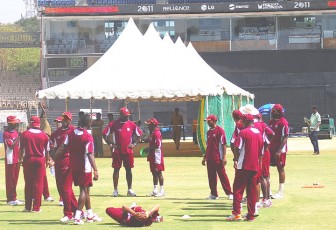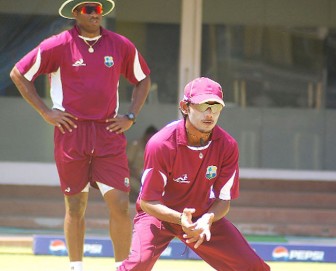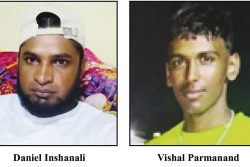by Tony Cozier
at the ICC World Cup In DHAKA
IN SPITE of their habitual meltdowns against England and India, the West Indies have somehow made it through to the World Cup quarter-finals.

Their prospects of moving on ever further are boosted since their opponents are Pakistan, as fickle as they themselves are and just as likely to carry on to take the championship for the first time since Imran Khan lifted the trophy at the Melbourne Cricket Ground in 1992 as they are to trump even the West Indies’ most sensational fiasco and lose.
The West Indies arrived last night in the Bangladesh capital, Dhaka, venue for tomorrow’s match, after a journey as strangely circuitous as their own advance to the final eight.
They flew from the south Indian city of Chennai, scene of Sunday’s capitulation to India in their final group match, further south to the Sri Lankan capital, Colombo, for a charter flight back north to Dhaka, a place of which they have mixed memories.
It was here that they thrashed the hosts Bangladesh three weeks ago, a result that effectively assured their progress; here that they were terrified out of their wits (and tweets) by a stone-throwing attack on their coach after the match by fans enraged by their team’s collapse to 58 all out.
Their three matches in the interim have substantiated their position as the lowest ranked of those they join in the last eight.
An efficient, hard-fought victory over spirited, but still unrated, Ireland was followed by the late order submissions to England (the last four wickets for 11) and India (eight for 34) when calm common sense should have ended a losing streak against higher ranked opponents that goes back almost two years.
The truth is that this is about as far as anyone, even themselves, ever expected them to reach.
Captain Darren Sammy has repeatedly said no more than that it was their first objective. Head coach Ottis Gibson’s guarded assessment was that they were not to be taken for granted and were capable of a few surprises.
This is a team in which only Shivnarine Chanderpaul (267), Chris Gayle (227) and Ramnaresh Sarwan (165) ha
e more than 60 One-Day Internationals on their record.
An essential all-rounder, Dwayne Bravo (110), was lost to injury even before the first match was through.

A couple of original choices, opener Adrian Barath and wicket-keeper Carlton Baugh, didn’t even make it to the event, eliminated by injuries in practice matches in Sri Lanka.
Four – Davendra Bishoo, Kirk Edwards, Andre Russell and Devon Thomas – were yet to play an ODI before they got to India.
In addition, a sequence of unusual circumstances thrust the captaincy onto Sammy, a wholehearted, but limited all-rounder previously unable to claim a regular place in the best 11 in either long or short formats.
These factors seriously upset the balance of the team. Throughout this campaign it has been top-heavy with all-rounders and bowlers, short of batsmen.
Chanderpaul’s loss of form that prompted his exclusion against England and India compounded the problem.
It meant Kieron Pollard, an imposing, but erratic, striker with an awesome reputation in the Twenty20 game, coming in as high as No.5 with the rookie Thomas, aged 21 with a first-class average of just three runs higher, at No.6.
It explains the brittleness of the batting, but not the mindless ways that have led to the clatter of wickets or the ever-present susceptibility to pressure.
Against India on Sunday night, Devon Smith, batting in the absence of Chris Gayle with the impressive assurance and maturity as he had not previously shown for the West Indies, laid a strong base for the innings before he was undone by a top ball from the dangerous left-armer Zaheer Khan for 81.
What followed was madness. Pollard hoisted his third delivery into long-on’s lap, a shot that might have been a DLF Maximum in the Indian Premier League (IPL) but not on the longer boundaries in the World Cup.
Thomas charged down the pitch to his eighth ball to be stumped, Sammy did the same from the non-striker’s end and was run out like a panicked schoolboy, Russell slapped a short ball into point’s chest. And so on until Ravi Rampaul’s missed swipe completed the innings 80 short of the requirement.
In contrast, the bowling has been efficiency itself. Apart from the opening match, against a South Africa team demonstrating every sign to make them eventual champions, the opposition was bowled out every time. India’s 268 was the highest of the totals.
Every bowler has made a significant contribution, if some more regularly than others.
The most heartening aspect has been how leg-spinner Davendra Bishoo, surprisingly summoned from the Caribbean to replace the elder Bravo, and Ravi Rampaul, the persevering fast bowler kept in the reserves through the first five matches, responded to the challenge.
Yet tough decisions now need to be made to strike a better balance in the 11 for tomorrow.
Chanderpaul’s form and diffidence did not present a convincing case for his inclusion but, after the last two, late order collapses his renewed presence at No.5 is now required.
The question is who should make way.
Ordinarily, Sammy would be the one to go, especially since he has not been confident enough to bowl himself more than three and six overs in each of the last two matches (against eight and all 10 for Pollard). But he is captain so someone else would have to stand down for Chanderpaul’s return, Pollard perhaps.
The leadership is an issue that clearly must be addressed once the tournament is over. For the time being at least, Sammy is at the helm. His place is guaranteed but he needs to raise his game that, if anything, has gone backwards under the pressures of the role.
With the main strike bowler, Roach (like Gayle), able to return after recovering from the fever that sidelined him against India and Russell and Rampaul demonstrating the value of direct, full length fast bowling, there would be room for just one spinner on what has been a true, even pitch at the Sher Bangla National Stadium for earlier matches.
On recent form, it would be Bishoo’s controlled leg-spin (20-0-84-3 in his two matches) ahead of the left-arm variety of Sulieman Benn who has faded following his 12 wickets in the first four matches, opening the bowling in each. His combined figures against England and India were none for 88 off 14 overs and he was threatening.
The quarter-finals are all knockout. For the winners there remains the chance for final glory; the losers silently return home.
For all their obvious weaknesses, the West Indies find themselves three wins away from their first World Cup since 1979. The reality is that all three matches are against higher ranked teams and the records indicate that it simply can’t be done.








